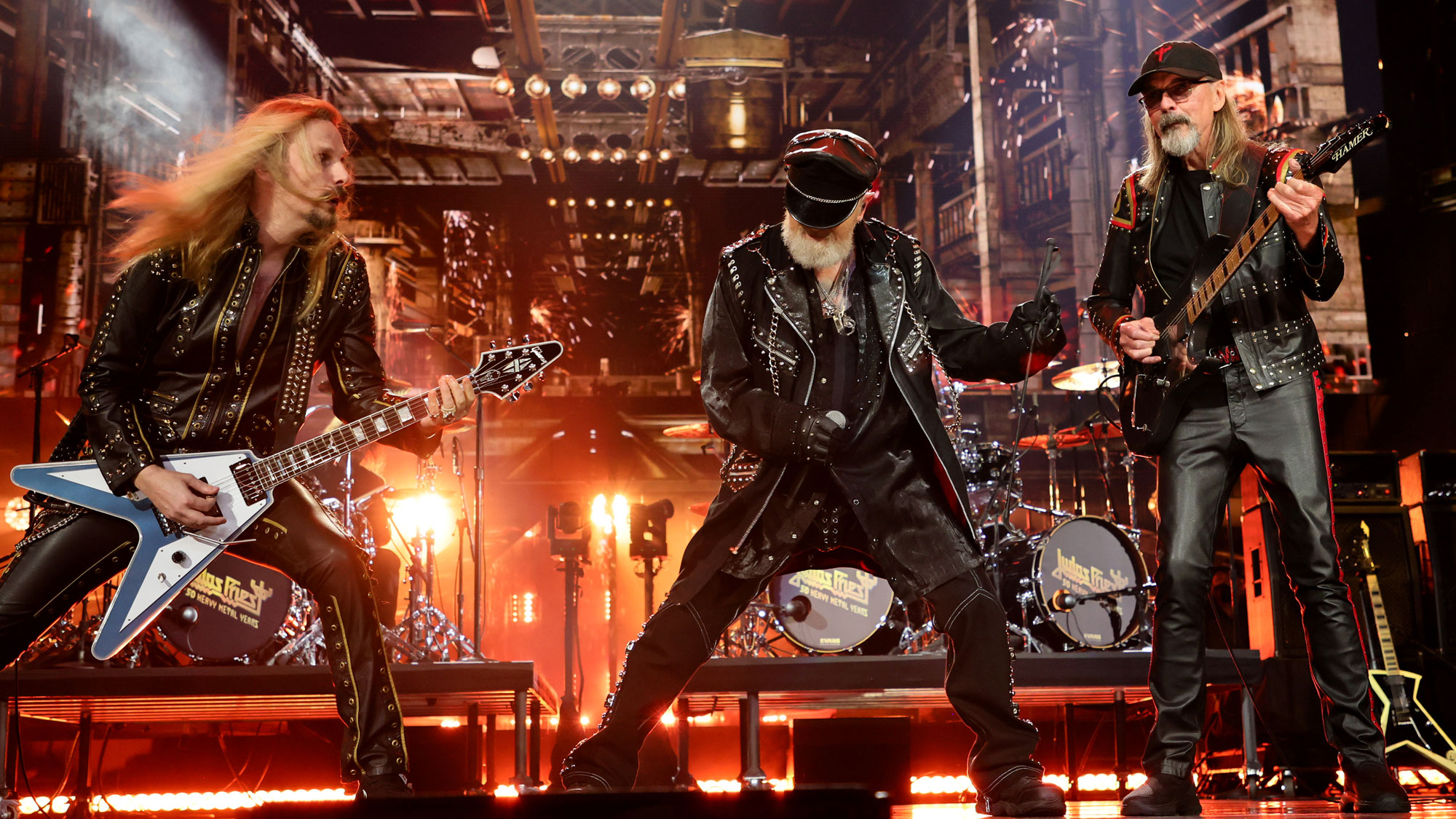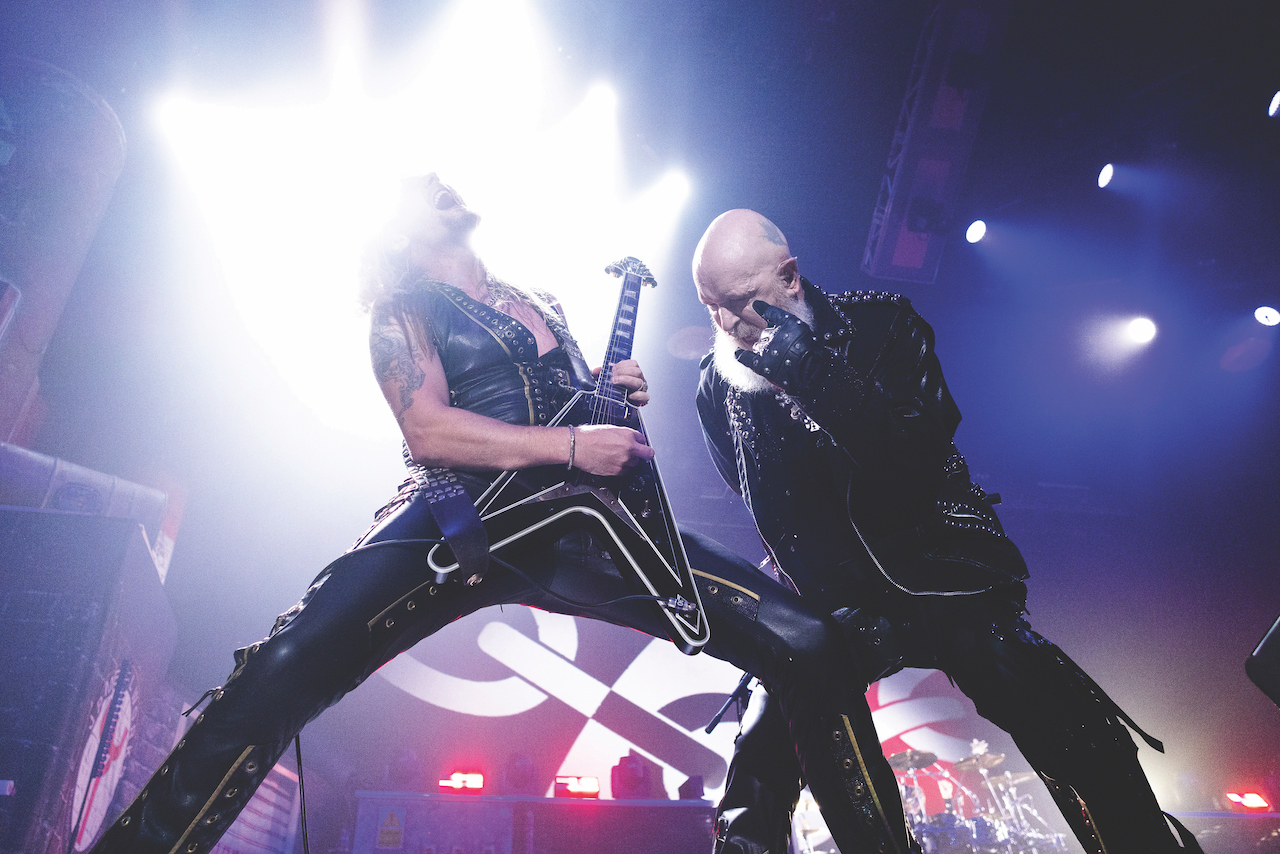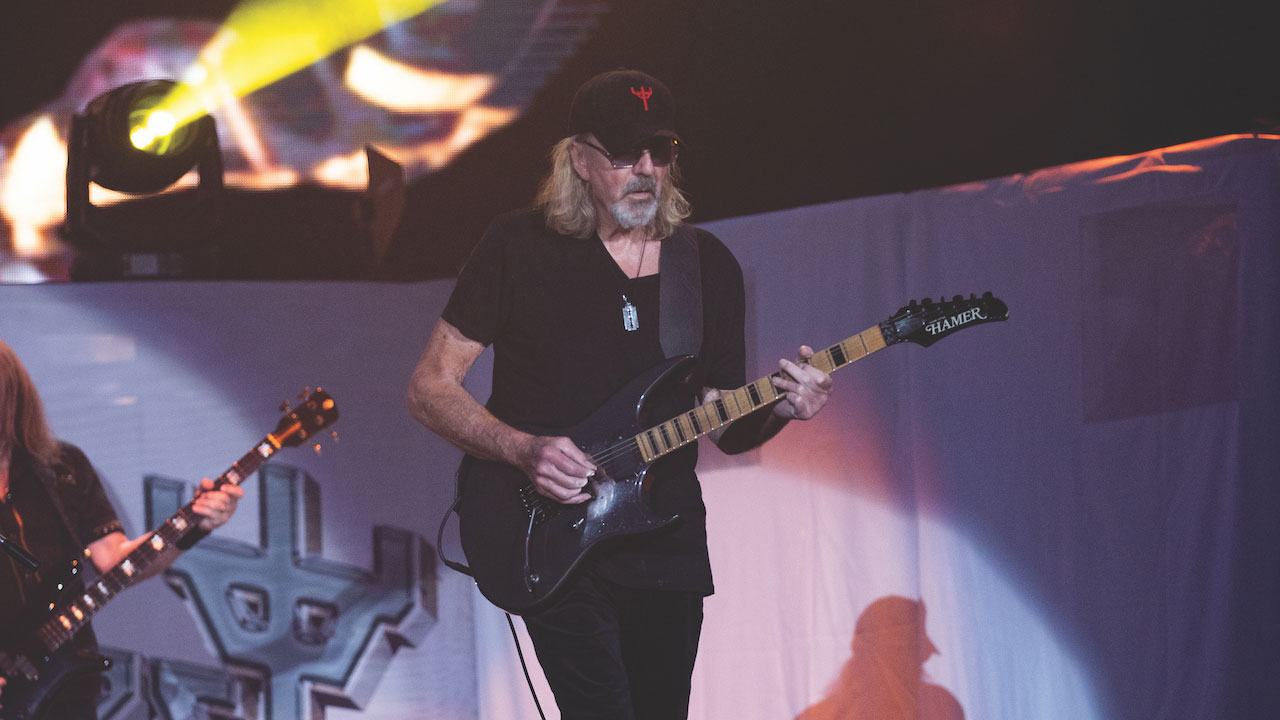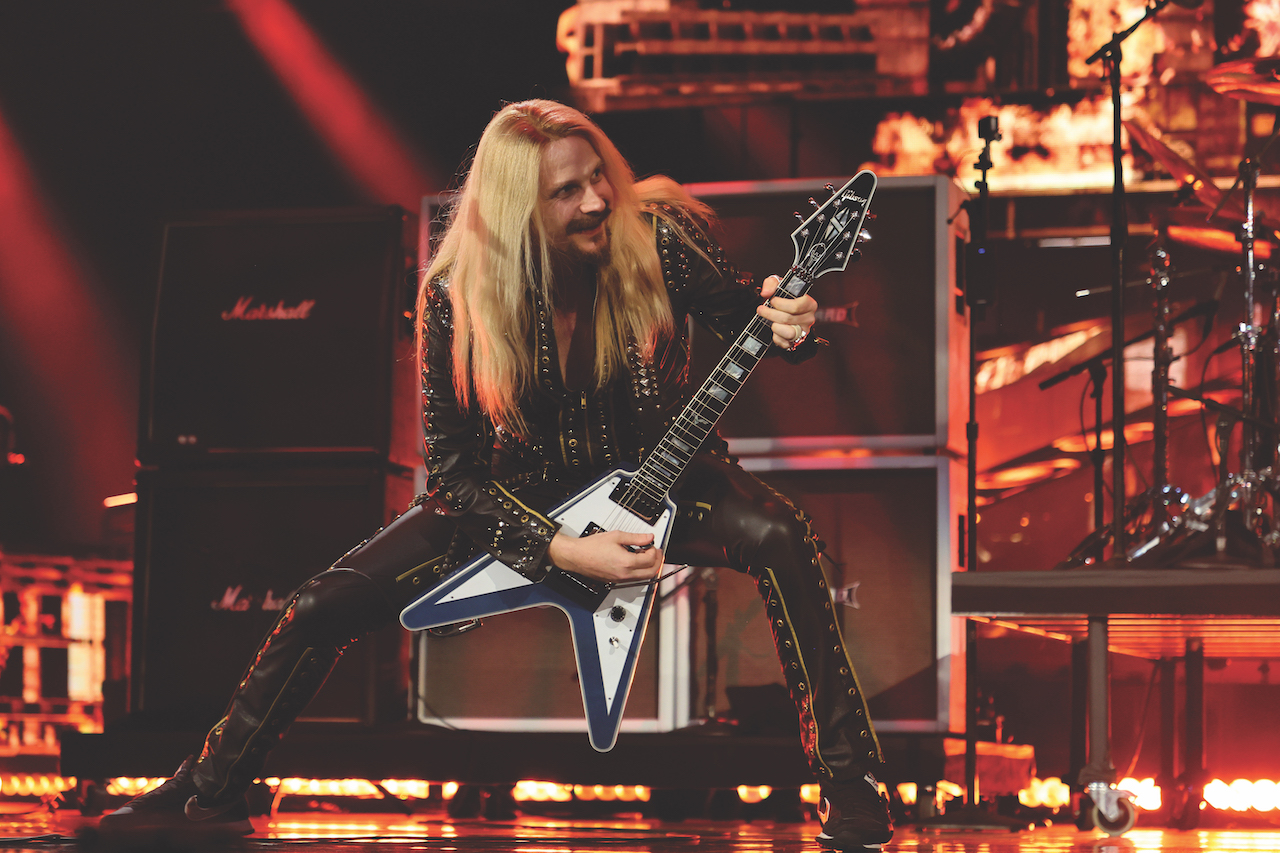
As they prepare for the release of their 19th album, Invincible Shield, Judas Priest are still pondering the randomness of life and the frailty of the human condition.
Since the release of their 2018’s blowtorch-to-the-face record, Firepower, most of the guys in the band have been anything but invincible. Vocalist Rob Halford has battled and seems to have beaten prostate cancer; guitarist Glenn Tipton continues to struggle with a debilitating case of Parkinson’s disease, which six years ago ended his ability to tour.
And lead guitarist Richie Faulkner vividly remembers suffering an aortic aneurysm on September 26, 2021, while Priest were playing the Louder Than Life festival in Louisville, Kentucky.
“It’s crazy to think I easily could have died then and there,” says Faulkner, who assumed pole position for the writing and recording of Invincible Shield and worked closely with Tipton to voice guitar ideas the guitar hero can no longer play. “If the hospital wasn’t so close to the venue and they didn’t have one of the leading heart surgery teams in the country, I definitely wouldn’t have made it.”
Faulkner’s survival and rapid recovery has been nothing short of miraculous, even with the intensive follow-up procedures he underwent and the continued precautions he has to undertake.
“Overall, my chest and everything is all fine,” Faulkner says. “I had to go back in again in 2022 to have another open-heart procedure, but that’s all fine and cleared up.
“One of the only side effects now is I have to play a bit more regularly. I’m not a young man anymore. I can’t leave the guitar for two weeks and then come back and be right up to speed. I have to stay on top of my playing, and some of that is a result of what happened.
“But as far as heart damage and the aorta stuff around it, it’s all fixed. And everything is kept at bay with medication. So, you never know what’s around the corner, but hopefully I’m okay now.”

From the opening riff of the fast, urgent album opener Panic Attack to the pounding, riff-saturated Giants in the Sky, a reference to deceased metal pioneers Ronnie James Dio and Lemmy Kilmister, Invincible Shield is a burst of energy, perseverance and defiance.
Reminiscent of Judas Priest’s classic ’80s albums Screaming for Vengeance and Defenders of the Faith, but with the contemporary production of Firepower, the new album is all volume, aggression and sonic acrobatics, ranging from the triumphant melodies of Crown of Horns to the barreling, full-blown and rhythmically complex The Serpent and the King.
While Invincible Shield is a powerful celebration of pure metal, it’s also a relentless, brazen middle finger to mortality and severe illness.
These songs are on fire. They’re absolutely blazing because no matter what we’re up against, the Priest will never curl up into a ball
Rob Halford
“Sometimes, mortality brings out the best in people,” says Halford, who was diagnosed with prostate cancer during the pandemic, underwent a prostatectomy and radiation therapy and has been cancer-free for two years.
“That kind of struggle with mortality is all over this record because the instinct to survive is something you channel into yourself as a person, and the things you’ve been through and witnessed come across in your music.
“These songs are on fire. They’re absolutely blazing because no matter what we’re up against, the Priest will never curl up into a ball. We’re kicking and screaming, horns up and legs out – metal boots stomping all over the place.”
During separate revealing Zoom interviews with Faulkner and Halford, and an email exchange with Tipton, the songwriting trio of Judas Priest addressed the obstacles they faced forging Invincible Shield, the way they had to modify their creative process, how their undying support for one another has brought them closer, and Faulkner’s constant battle to evolve as a player and composer and his unwillingness to settle for anything short of topping his last great achievement.
Where do you see Invincible Shield in relation to the rest of the band’s catalog?
Richie Faulkner: “People keep comparing this to other things we’ve done, and I understand their desire to do that, but I think Invincible Shield is very much Priest today. That classic sound is ingrained in everyone, including me, but we always try to do something a little bit different than what we’ve done before. And that doesn’t come from some need to do something different; it comes naturally.
“I think creative people naturally try to do things that are new and inspiring to them. As a musician, you have to scratch that creative itch and do stuff that satisfies you.”
This is probably one of the most definitive Priest metal albums we’ve done
Rob Halford
Rob Halford: “This is probably one of the most definitive Priest metal albums we’ve done. I think it’s a reflection of where we’re at now, and a continuation from where we were with Firepower while making references to other places in Priest’s history.”
Richie, how do you see Invincible Shield as a development of your contributions to the band?
Faulkner: “As a guitar player, I’m always thinking of how I can make what I’m doing better than what I did the last time. I focus a lot on how I can make what I wrote more appropriate and more valuable as a musical statement. So maybe I’ll construct the solos before recording them. That’s something different for me.”
Is that what you did for Invincible Shield?
Faulkner: “I constructed a few of my leads early and brought them into the studio. That gave me a foundation to work from. I still did about 70 percent of my solos in the studio, but what I did was run through one that’s improvised, and then run through another I wrote. After a couple takes, there are motifs that become prominent, and that’s what I build the whole solo around.”

You’ve established yourself as the lead guitarist for Judas Priest without altering the band’s core sound.
Faulkner: “After 13 years in Priest playing both Glenn’s and K.K. [Downing, former Priest guitarist]’s stuff, everything they’ve done has become a part of my style as well. On a very intimate level, I’m playing the Painkiller solo every night, so that’s become a part of my vocabulary. So, I’m doing things like sweep picking and some tapping, which is new for me.”
Did you want to write differently than you have in the past?
I always try to look forward and be optimistic – that's how I go about my guitar playing
Glenn Tipton
Faulkner: “I’ve always been attracted to slightly progressive elements, and I think we’re all into that, so I introduced some parts that were a bit unconventional in that sense this time. And if they didn’t tick the right boxes, we left them on the shelf and found something else that worked better.
”But a lot of those parts stayed in, which was exciting. Maybe they were a little more progressive, maybe they weren’t. The only rule was that it had to sound like Judas Priest, and that left a lot of room to explore.”
Did you feel more comfortable writing with the guys on Invincible Shield than you did on Firepower?
Faulkner: “It was just a little different. I went in thinking, ‘Okay, you’ve got a bit of history with the band now. You co-wrote two records with them. How can you make this one better?’ I know better is a nebulous term, but for me, it’s got to be better. I’m representing one of the biggest and most influential heavy metal bands in the world, and the bar is higher. But that’s nothing new.
“What’s different, obviously, is Glenn’s situation is different now than it was for the first two albums I did with Priest. I knew I was going to have to take on more of the guitar load.”
Did you work more with Rob than you did before?
Faulkner: “We did a lot together. Rob and I would put ideas together in the studio. Rob would usually come in with a vocal idea and I’d find something that worked with it on guitar.
“At first, you might not know what you’ve got, but a little way into the creative process, the album takes on its own character. And once you recognize that character, you start to embellish it. At the end, hopefully you’ve got this monster that you can unleash on the world. It’s exciting. It’s scary, though.”
What was scary about making Invincible Shield?
The only rule was that it had to sound like Judas Priest, and that left a lot of room to explore
Richie Faulkner
Faulkner: “Firepower was a really well-received record. It was a big success. Now, how do you follow that? They’ve done it before, but this was my first rodeo with that kind of situation – following up something that’s been really well received. That was a challenge, but it’s a good challenge to have because you have to up the bar on yourself.”
Can’t you make yourself crazy constantly trying to better yourself?
Faulkner: “Challenges are what make albums unique, and there’s always a unique challenge for every album. When I was younger, maybe it was financial constraints. You didn’t have enough time in the studio, or the studio wasn’t big enough, or didn’t work the way you wanted it to. There are always challenges you have to work around.
“With Angel of Retribution, I was getting my studio bearings. And then we couldn’t record during a pandemic. And then we had a tour, so we had to record during the gaps in the tour. That was another challenge. But the challenges always happen right up until the album is complete and you’re satisfied. Before that, you’re always thinking it could be better or it’s not quite right, so you work on it to embellish it or make it more interesting.”

Can you think of a particular challenge you faced with a song on Invincible Shield?
Faulkner: “The original version of Panic Attack had another slower part before the guitar solo. It was too long. It didn’t feel right, so we took it out. When it’s right, you know it’s right, but sometimes it’s hard to tell why it’s not right. One thing I always think about is if it’s not grooving, it’s not right. When it’s vibing, that’s when you know you’ve finally gotten it.”
Glenn, you’ve been upfront about how you can’t play the way you used to because of Parkinson’s disease, which must be terribly frustrating. Did you change the way you worked as a band to accommodate your condition?
Glenn Tipton: “No, the three of us all worked together the same as normal. However, it is hard for me to give 100 percent now due to my Parkinson’s so Richie took more of the load. But I always try to look forward and ahead and be optimistic – that’s how I go about my guitar playing.”
When we were in the room together, and when Glenn had an idea, but he couldn’t play it, he would communicate the idea to me and tell me what to do. That might trigger a new idea from me
Richie Faulkner
Faulkner: “Writing-wise, when we were in the room together, and when Glenn had an idea, but he couldn’t play it, he would communicate the idea to me and tell me what to do. That might trigger a new idea from me, so there was a lot of back and forth. There were other ideas he had that he could play, and he played those.”
Tipton: “I have to take each day as it comes. Some days I feel strong, so I have a good day and I can play more. And others I feel weak so I can’t really play much.”
Halford: “Yes, but Glenn – his input, his validity, the reference points that he makes with his hands – are all over this album. So, as far as what this man stands for in the life of Judas Priest, the relationship hasn’t changed a bit. The only thing that’s changed is the way Parkinson’s has robbed him of his articulation on the guitar.
“So, he has very, very carefully passed over certain feelings toward the guitar passages to Richie. You’re hearing guitars that make you think of Glenn because that’s the way Glenn would perform. But it’s Richie playing a lot of it. So Glenn is all over this album. He’s playing on a lot of the songs, but those moments where he wasn’t able to, Richie is picking up and carrying that metal torch for Glenn.”
Glenn, do you sit or hold the guitar differently when you play, or play a lighter guitar?
Tipton: “No, I do everything the same and I still use my same guitars – the Hamer Phantom Signature Model and my Hamer Signature GTX. But I have to work very hard to get the sounds I want these days. I did come up with some guitar parts on my own, but when Richie was involved, he took the ideas I put forward and improved on them.”
Richie, when you came in with a song, did Glenn work with you on it or did you just record what you wrote?
Faulkner: “Glenn knows exactly how to make something sound like Priest. I might come in with an almost complete song, and Glenn would suggest a little turnaround that was totally out of my school of thinking, and it made the song better. And then there are a couple of songs on the record, Sons of Thunder and Escape From Reality, and those were primarily Glenn’s ideas, and he had more to do with them.
“Obviously, it was a challenge to make everything work, but I think we knew how to handle it and we all worked together in a way that was really rewarding.”
Halford: “What’s interesting about Richie is the way I’ve watched him transform from the guitar player that he was when he first became the lead guitarist for Judas Priest for Redeemer of Souls, to the creative and empathetic musician he is today.
“Glenn mentored Richie, and Richie loves Glenn so much that the understanding of everything Glenn has done with Priest has become a part of who Richie is. And that understanding has been very profound.
“Over the past 10 or so years, Richie has matured and blossomed as a guitarist so he has his own identity – his own distinctive way of playing – and at the same time, he’s been able to move to another place to pick up for another guitar player.
“There are very few people that can do that and do it so well and with such love and such care and understanding, so that you get an extraordinary performance whether Richie is playing something he wrote or playing something for Glenn.”
Richie, did you play all the leads on the album?
Faulkner: “Not all of them. Glenn could manage Sons of Thunder, Vicious Circle and a couple others. But if he couldn’t play something, I took the helm.”
Did you try to play those leads in Glenn’s style?
Faulkner: “As a player, I’m so heavily influenced by Glenn anyway, but I don’t play as much legato as him. I come from the Zakk Wylde school of picking, and Zakk picks every note. I can’t do that, but I pick most of the notes. There’s a little bit of legato in my style, but there was definitely more legato going on before.
“But having said that, I did kind of take on that role of playing a lot of Glenn’s parts. If he couldn’t do it, I’d take on that role. There’s stuff I played on that’s unmistakably Tipton, both in the composition and guitar technique. But that’s why he’s such a vital and important part of Priest.”
What guitar sound were you shooting for on Invincible Shield? It sounds very Priest, but as you said, there’s something about the sound that makes it very relevant today.
Faulkner: “Well, it’s a good old Marshall JCM800 with a Tube Screamer-type pedal in the front. It’s a tried and tested approach when it comes to the way we EQ my sound. I’m quite a mid-heavy player, anyway. I think it gives the guitar extra presence and character.
“But after I recorded everything with my setup, I sent the tracks to producer Andy Sneap, and he re-amped them in his studio because I’ve got no time for microphone placement, and Andy is a real authority on that. So I sent him the DI tracks and he put them through cabinets and amplifiers that he’s got. He was using 800s and plexis to find that good, old Priest sound.
“There aren’t many effects there, but there’s a bit of reverb and delay that was done post-production. But at the heart of it, it’s that Marshall sound through a Gibson Explorer and one of my Flying Vs.”
An Ibanez Tube Screamer is a go-to for blues and other kinds of rock, but when you play it through a tube amp it tightens up the low-end and provides extra texture.
Faulkner: “You ramp up the distortion on the JCM800 and that’s the main sound. The Tube Screamer wasn’t an Ibanez – it was a clone of a clone, a [Wampler] Tumnus [overdrive] that I have in front of my amps on stage.”
Would Invincible Shield be a good swan song for Judas Priest, or will there be another album?
Faulkner: “Who knows? If this one’s well received and there are enough ideas creatively to do another one, then it’s possible. We’ll have to wait and see, really. At this moment, I’m out of ideas. I’ve got nothing left. That always happens with me, and then I start coming up with things. But where are these ideas going to come from? I don’t know.
“But somehow, somewhere along the line, you start building up ideas and songs. They come from somewhere. After Firepower I was out of ideas and then we somehow created Invincible Shield. We’ll see what the future holds.”
It’s absolutely glorious that we’re still out there… If that isn’t the embodiment of metal never dying and metal never surrendering, then I don’t know what is
Rob Halford
Halford: “I think Richie is an endless well of guitar ideas, and Glenn has vaults of riffs we’ve never used, and a good riff will last forever. It’s all about perspective and presentation. When you’ve got all that sorted out, why stop? There’s a fire that’s really burning right now and it has been even before Invincible Shield left the launch pad. Right now, we’re focused on touring for the album, but when we finish touring, what are we going to do?
“Well, Priest has always maintained its relevance and importance in metal by showing you what we can do next. And the other thing is, I don’t like 19. It’s an odd number. I’m an ‘even number’ kind of guy. I like 20.
“But the bottom line is it’s absolutely glorious that we’re still out there. Glenn’s still thriving as a musician, and so is Richie after what he went through with his heart condition. I’m thriving after what I went through with my cancer condition. If that isn’t the embodiment of metal never dying and metal never surrendering, then I don’t know what is.
“There’s this importance in our lives as musicians to never give up and never give in, to also keep pushing ahead and going toward the metal torch on the horizon. That’s what drives us.”
- Invincible Shield is out now via Epic.







